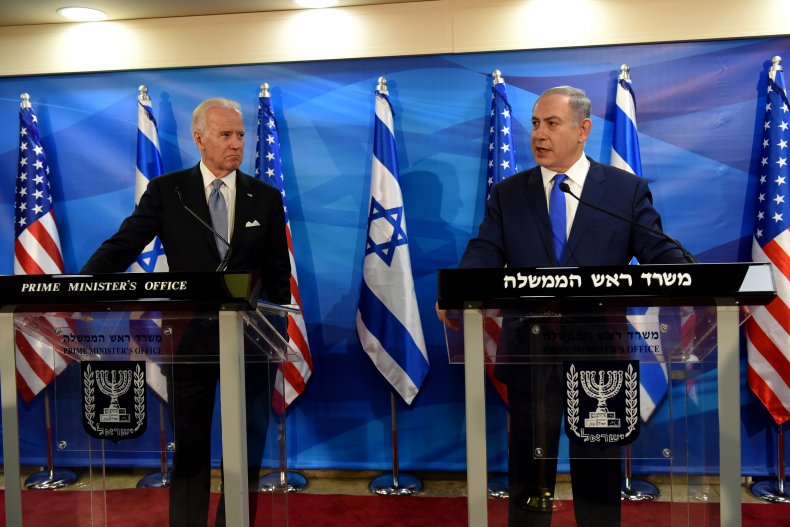As Biden Joins Ceasefire Calls, Israel Vows to 'Continue Striking'
President Joe Biden has joined growing international calls for a ceasefire in the worsening conflict between the Israeli military and Palestinian factions operation out of the Gaza Strip.
But Israeli Prime Minister Benjamin Netanyahu has vowed to press on with his campaign against enemy fighters.
In his third call with the Israeli leader since rising tensions between Israelis and Palestinians erupted a week ago into the worst conflagration among rival forces in years, Biden "reiterated his firm support for Israel's right to defend itself against indiscriminate rocket attacks" launched by a coalition of Palestinian groups led by the Hamas movement, and "welcomed efforts to address intercommunal violence and to bring calm to Jerusalem" amid deadly sectarian unrest.
Biden also "encouraged Israel to make every effort to ensure the protection of innocent civilians" as the Palestinian death toll soared past 200.
As the two men "discussed progress in Israel's military operations against Hamas and other terrorist groups in Gaza," Biden for the first time since fighting broke out "expressed his support for a ceasefire and discussed U.S. engagement with Egypt and other partners towards that end."
The White House and State Department have signaled in recent days that U.S. officials were in touch with counterparts from a number of regional countries, in which all parties expressed calls for calm and an end to the fighting. The administration had, however, avoided using the term ceasefire until now.
On Friday, Secretary of State Antony Blinken said that Washington has "made clear that we are prepared to lend our support and good offices to the parties should they seek a ceasefire."
Israeli officials, however, have been adamant about the need to first ensure the degrading of the military capabilities of Hamas and allied factions like Palestinian Islamic Jihad before operations would be called off or even halted.
Netanyahu stated the campaign would continue in remarks delivered following consultations with lead security officials including Defense Minister Benny Gantz, IDF Chief-of-Staff Lieutenant General Aviv Kochavi, Shin Bet Director Nadav Argaman, Mossad Director Yossi Cohen and National Security Adviser Meir Ben Shabat.
"The directive is to continue striking at the terrorist targets," Netanyahu said. "The IDF is doing this very well."
The Israeli leader hailed recent strikes targeting enemy senior personnel such as top Palestinian Islamic Jihad commander Hussam Abu Harbid, and enemy capabilities including Hamas' naval units and underground tunnel network, known to the IDF as "the metro."
"We will continue to operate as long as needed to restore quiet and security to all Israelis," Netanyahu said.

The Israeli commander-in-chief's words were later echoed by Kochavi. He praised the work of the IDF Southern Command leadership, whose tenacity in striking at Hamas amid a barrage of what Israeli estimates place at some 3,350 rockets, many of which have been intercepted by the Iron Dome, he said caught the Palestinian side off guard.
"Hamas was surprised by our strength, methods and achievements, and they are now suffering severe consequences," Kovachi said. "This operation will continue as long as necessary."
A Hamas spokesperson outlined to Newsweek the demands of the coalition of Gaza-based forces called the Palestinian Joint Operations Room, whose "goals are to have the Israeli occupation authorities accept our demands."
These objectives include "giving free access to worshipers from all parts of Palestine to pray at Al Aqsa Mosque without restriction or harassment by the Israeli police or the Israeli settlers and halting the attempts to expel the Palestinian residents of Sheikh Jarrah."
The current conflagration between in the decades-long conflict can be traced back to a court case in which Israeli families attempted to evict Palestinian inhabitants of the Sheikh Jarrah neighborhood of Israel-occupied East Jerusalem. Unrest mounted, culminating in an Israeli raid on the Al-Aqsa Mosque, the third holiest site in Islam, an operation that sparked outrage across the Muslim World and threats of rocket fire that Hamas ultimately made good on.
While Arab countries have joined Hamas supporters Iran and Turkey in condemning Israel, they have expressed official support for the rocket attacks, and many have instead called for a cessation of hostilities. Secretary of State Antony Blinken has held conversations over the past week with officials from Egypt, Qatar, Saudi Arabia, Tunisia, Jordan and, most recently, the United Arab Emirates.
The State Department also released a readout of a call between Blinken and his Israeli counterpart Gabi Ashkenazi minutes before the White House issued the readout between Biden and Netanyahu.
Blinken was said to have "discussed U.S. efforts to bring an end to the violence, which has claimed the lives of Israeli and Palestinian civilians, including children," and "expressed deep concern at the inter-communal violence." The pair also "discussed the path forward, and the Secretary noted that the United States would remain engaged with Israel, the Palestinian Authority, and other regional stakeholders as part of our diplomacy to ease tensions and put an end to the hostilities."
This is a developing news story. More information will be added as it becomes available.

